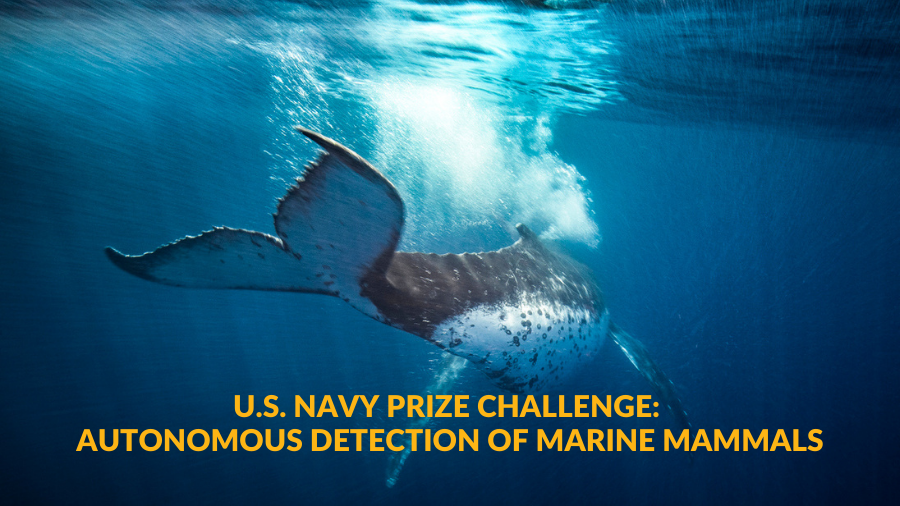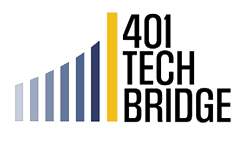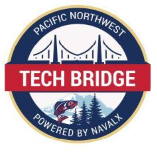
U.S. Navy Prize Challenge: Autonomous Detection of Marine Mammals

NSIN, in partnership with Naval X Northwest Tech Bridge, 401 Tech Bridge, Washington Maritime Blue, and Quiet Sound, is supporting the U.S. Navy Prize Challenge: Autonomous Detection of Marine Mammals.
The U.S. Navy, as part of its commitment to train, test, and operate worldwide in an environmentally responsible manner, is seeking innovative solutions to enhance real-time detection of killer whales (Orcinus orca), right whales (Eubalaena glacialis, E. japonica, and E. australis), or both in high vessel traffic areas. The ultimate goal is a prototype that employs transformation technology or a combination of existing technologies to detect, classify, and display marine mammal locations in real-time, allowing an autonomous vessel to take proactive measures to avoid the use of sonar or a strike. This technology will also apply to human-crewed commercial vehicles (e.g. high-speed catamaran passenger ferries).
Challenge Overview
Challenge ID: 7694570419
The Navy is seeking innovative solutions to enhance real-time detection of killer whales (Orcinus orca) or North Atlantic right whales or both in high vessel traffic areas. A multi-stage effort will be utilized to pursue the ultimate goal of a prototype that employs transformational technology or a combination of existing technologies to detect, classify, and display marine mammal location in real-time, allowing an autonomous vessel to take proactive measures to avoid a strike. This technology will also be applicable to manned commercial vehicles (e.g., high-speed catamaran passenger ferries).
This Challenge is the first phase of this multi-stage effort aimed at producing a system possessing combined multi-sensor data streams ready for future analysis by an onboard operational decision management tool or transmission to the cloud.
The goal of the first phase is to develop a system of sensors to detect killer whales and North Atlantic right whales with at least one above-water sensor and one below-water sensor. Data from these sensors must be time synchronized and include — at a minimum — the vehicle position and orientation, sensor data, time-stamp, sensor settings, sensor position, and sensor orientation.
A submission to the Challenge should include the following:
- A detailed description of the proposed Solution addressing specific Solution Requirements presented in the Detailed Description of the Challenge. This should also include a thorough description of the platform and sensors used in the Solution accompanied by a well-articulated rationale for the method employed.
- Source code and executables for any software developed for this Challenge. Complete description of any commercial software utilized in the proposed solution.
- Simulated or recorded data from each sensor, individually, that indicates its ability to detect and classify the marine mammals of interest. Ideally, this will include recorded data from one or more marine mammal(s) or simulations of marine mammals.
- Documented results of a demonstration that incorporates the sensors into a platform for data collection. The demonstration should be conducted in-water (preferred) or in a laboratory environment.
The Challenge award is contingent upon evaluation of the submission by the Seeker. This Challenge has a total award pool of $75,500 with no less than $50,000 awarded to the best submission that meets the Solution Requirements of the Challenge. Up to two additional awards may be made from the remaining award pool for submissions of high merit. In addition to a cash award, this Prize Challenge may serve as the source selection for potential compensated follow-on work.
To receive an award, the Solvers will not have to transfer their exclusive IP rights to the Seeker. Instead, Solvers will grant to the Seeker a non-exclusive license to practice their solutions. Please see the Challenge Specific Agreement (CSA) for full details.
Submissions to this Challenge must be received by 11:59 PM (US Eastern Time) on March 31, 2022. * Late submissions will not be considered.*



